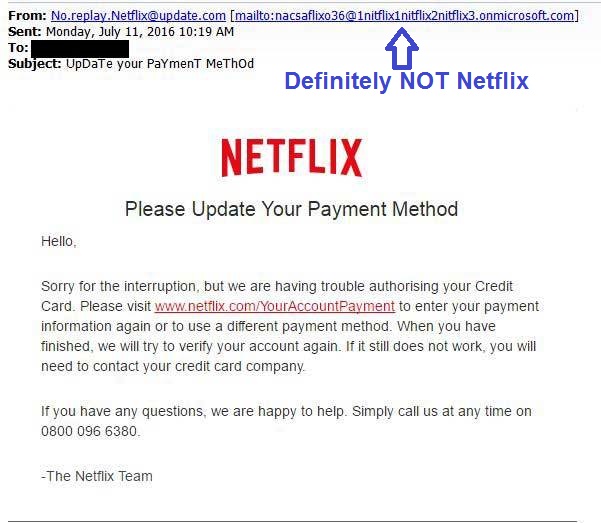Netflix Summer Scam Asks for Your Personal Data and Remote Access to Your Computer
July 21, 2016
There is yet another scam going around this summer, but it really has nothing to do with the season. The Better Business Bureau is warning about one involving Netflix. Some users have received a notice stating there is an issue with their payment card and to visit a link to resolve it. When the link is clicked, it appears to be an actual Netflix login page. However, it is a fake site.

The link looks like it goes to a page on the company’s site, but the page it really goes to request account information and other personal details. Then a dialogue states the account has been suspended. Of course the users panic and call the “customer service” number on the page, which actually goes to fake representatives.
But wait! There’s more! The agent, just being helpful, encourages the user to download “Netflix support software,” which is actually remote login software that allows the so-called rep to get into the user’s computer. That is not cool.
Watch out for indicators of scams like this. Whenever calling customer service, it’s always best to go to the website directly and get the contact details. In other words, don’t use the information provided on a page that you got to by clicking a link. Don’t use the info in the email message either.
And while we’re talking about links, avoid clicking those in the first place when they arrive in email messages. So often, they are phishing and the outcome is not going to be in your favor. If you have a Netflix account, or any other account, use a previously bookmarked link to get there. You can also manually type the URL into the address bar and get there. Just be careful not to type and get caught out by typo squatters.
You should never allow someone you don’t know to log into your computer remotely. In fact, unless you are getting support from an internal IT support person that you know and trust, you should not give anyone remote access to your computer. That just gives them access to do all kinds of nefarious things.
If you get an email with a link or attachment that is unexpected, view it with much skepticism and if you are not 100% certain it’s safe, just don’t click it at all. If you really want to know if it’s legitimate, contact the sender by a known phone number or by starting a completely new email message and asking.
Netflix says that they will not ask to log in remotely to anyone’s computer so if they do ask, you already know it’s a scam. Also, a Netflix page should not act as a popup. It is reported that this page does, so that is another dead giveaway that it’s phony.
One example of the notification had British spellings of words and an international phone number listed. These little details are important when identifying scams, so don’t panic and take some time to notice what is actually written. If there are typos, it sends you to a number in another country (most U.S. customer service numbers will be U. S. numbers or toll-free numbers), or doesn’t make sense, it’s likely phishing and you should just send it to the trash and go outside and enjoy the summer.
© Copyright 2016 Stickley on Security

